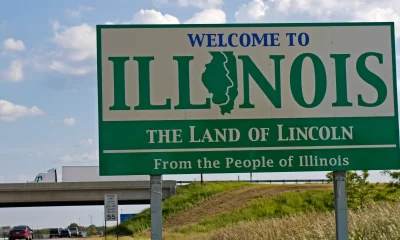Business
Illinois Governor Appoints New Top Cannabis Regulator

The appointment fills the position of Cannabis Regulation Oversight Officer.
Illinois has a new top cannabis regulator following an appointment from Gov. J.B. Pritzker on Monday.
Pritzker announced that Erin A. Johnson will now serve as the state’s Cannabis Regulation Oversight Officer. Johnson replaces Danielle Perry, who left the role earlier this year.
“Erin Johnson’s commitment to equity will serve Illinois well as she takes the reins as the state’s Cannabis Regulation Oversight Officer,” Pritzker, a Democrat, said in a statement on Monday. “From serving as the Chief of Staff at the Illinois Department of Juvenile Justice to working as Associate General Counsel and Chief Diversity Officer, Erin has the experience, education, and expertise to thrive in this role while advancing cannabis equity throughout Illinois. I can think of no better person than Erin to serve as our Cannabis Regulation Oversight Officer and I wish her all the best in this new position.”
The Cannabis Regulation Oversight Office is “a part of the Illinois Department of Financial and Professional Regulation and is responsible for coordinating with numerous state agencies to direct the regulation and taxation of Illinois’ cannabis industry,” according to the governor’s office.
“This work is done to ensure Illinois’ social equity goals are met through expungements, community reinvestment, and the diversification of the state’s cannabis industry,” said the press release from Pritzker’s office.
Johnson’s appointment must be confirmed by the Illinois state Senate.
“I am incredibly thankful to Governor Pritzker for trusting me to lead the administration’s cannabis regulation efforts,” Johnson said in Monday’s press release. “Together we will move Illinois forward and continue to build a cannabis industry that is driven by social equity, providing opportunities and righting generations of wrongs.”

Pritzker, who won re-election earlier this month, signed the bill that legalized recreational cannabis in Illinois in the summer of 2019. In the three years since, the governor has made the new adult-use marijuana program a centerpiece of his tenure.
Earlier this month, Pritzker announced that the state was earmarking $8.75 million in loans to “all conditionally-approved social equity loan applicants in order to provide immediate access to capital.”
“Equity has always been at the core of our cannabis legalization process. It’s why we expunged hundreds of thousands [of] low-level cannabis charges and instituted the Cannabis Social Equity Loan Program. But I know that if we want to create a truly equitable cannabis industry in Illinois, we must give our business owners the resources they need to grow—both figuratively and literally,” said Pritzker. “That’s why we are launching this Direct Forgivable Loan Program to provide a much-needed jumpstart for social equity applicants who’ve faced hurdles in pursuit of capital funding. This $8.75 million will help our social equity licensees open their doors for business—a major step towards creating a prosperous cannabis industry here in Illinois.”
The governor’s office explained that the program “is a first-of-its-kind program that launched in the summer of 2021 with the goal of providing low-interest loans to social equity licensees through a partnership with lending institutions,” and that participants in the program “have encountered significant delays in receiving capital through financial institutions due to the complexities of navigating a new industry that remains illegal under federal law, as well as institutions’ fiduciary, regulatory responsibilities and underwriting standards that are set independent of the program.”
“The new Direct Forgivable Loan Program fully financed by the State offers funding for all eligible program participants upon the submission of required documentation,” Pritzker’s office explained. “Because [the Illinois Department of Commerce and Economic Opportunity] has already received significant documentation from program participants, the additional documentation requirements for a direct forgivable loan are minimal to allow for prompt disbursal of funds. The forgivable loan has an 18-month grace period with no payments or interest accrued to provide businesses with flexibility.”
Source: https://hightimes.com/news/illinois-governor-appoints-new-top-cannabis-regulator/
Business
New Mexico cannabis operator fined, loses license for alleged BioTrack fraud

New Mexico regulators fined a cannabis operator nearly $300,000 and revoked its license after the company allegedly created fake reports in the state’s traceability software.
The New Mexico Cannabis Control Division (CCD) accused marijuana manufacturer and retailer Golden Roots of 11 violations, according to Albuquerque Business First.
Golden Roots operates the The Cannabis Revolution Dispensary.
The majority of the violations are related to the Albuquerque company’s improper use of BioTrack, which has been New Mexico’s track-and-trace vendor since 2015.
The CCD alleges Golden Roots reported marijuana production only two months after it had received its vertically integrated license, according to Albuquerque Business First.
Because cannabis takes longer than two months to be cultivated, the CCD was suspicious of the report.
After inspecting the company’s premises, the CCD alleged Golden Roots reported cultivation, transportation and sales in BioTrack but wasn’t able to provide officers who inspected the site evidence that the operator was cultivating cannabis.
In April, the CCD revoked Golden Roots’ license and issued a $10,000 fine, according to the news outlet.
The company requested a hearing, which the regulator scheduled for Sept. 1.
At the hearing, the CCD testified that the company’s dried-cannabis weights in BioTrack were suspicious because they didn’t seem to accurately reflect how much weight marijuana loses as it dries.
Company employees also poorly accounted for why they were making adjustments in the system of up to 24 pounds of cannabis, making comments such as “bad” or “mistake” in the software, Albuquerque Business First reported.
Golden Roots was fined $298,972.05 – the amount regulators allege the company made selling products that weren’t properly accounted for in BioTrack.
The CCD has been cracking down on cannabis operators accused of selling products procured from out-of-state or not grown legally:
- Regulators alleged in August that Albuquerque dispensary Sawmill Sweet Leaf sold out-of-state products and didn’t have a license for extraction.
- Paradise Exotics Distro lost its license in July after regulators alleged the company sold products made in California.
Golden Roots was the first alleged rulebreaker in New Mexico to be asked to pay a large fine.
Source: https://mjbizdaily.com/new-mexico-cannabis-operator-fined-loses-license-for-alleged-biotrack-fraud/
Business
Marijuana companies suing US attorney general in federal prohibition challenge

Four marijuana companies, including a multistate operator, have filed a lawsuit against U.S. Attorney General Merrick Garland in which they allege the federal MJ prohibition under the Controlled Substances Act is no longer constitutional.
According to the complaint, filed Thursday in U.S. District Court in Massachusetts, retailer Canna Provisions, Treevit delivery service CEO Gyasi Sellers, cultivator Wiseacre Farm and MSO Verano Holdings Corp. are all harmed by “the federal government’s unconstitutional ban on cultivating, manufacturing, distributing, or possessing intrastate marijuana.”
Verano is headquartered in Chicago but has operations in Massachusetts; the other three operators are based in Massachusetts.
The lawsuit seeks a ruling that the “Controlled Substances Act is unconstitutional as applied to the intrastate cultivation, manufacture, possession, and distribution of marijuana pursuant to state law.”
The companies want the case to go before the U.S. Supreme Court.
They hired prominent law firm Boies Schiller Flexner to represent them.
The New York-based firm’s principal is David Boies, whose former clients include Microsoft, former presidential candidate Al Gore and Elizabeth Holmes’ disgraced startup Theranos.
Similar challenges to the federal Controlled Substances Act (CSA) have failed.
One such challenge led to a landmark Supreme Court decision in 2005.
In Gonzalez vs. Raich, the highest court in the United States ruled in a 6-3 decision that the commerce clause of the U.S. Constitution gave Congress the power to outlaw marijuana federally, even though state laws allow the cultivation and sale of cannabis.
In the 18 years since that ruling, 23 states and the District of Columbia have legalized adult-use marijuana and the federal government has allowed a multibillion-dollar cannabis industry to thrive.
Since both Congress and the U.S. Department of Justice, currently headed by Garland, have declined to intervene in state-licensed marijuana markets, the key facts that led to the Supreme Court’s 2005 ruling “no longer apply,” Boies said in a statement Thursday.
“The Supreme Court has since made clear that the federal government lacks the authority to regulate purely intrastate commerce,” Boies said.
“Moreover, the facts on which those precedents are based are no longer true.”
Verano President Darren Weiss said in a statement the company is “prepared to bring this case all the way to the Supreme Court in order to align federal law with how Congress has acted for years.”
While the Biden administration’s push to reschedule marijuana would help solve marijuana operators’ federal tax woes, neither rescheduling nor modest Congressional reforms such as the SAFER Banking Act “solve the fundamental issue,” Weiss added.
“The application of the CSA to lawful state-run cannabis business is an unconstitutional overreach on state sovereignty that has led to decades of harm, failed businesses, lost jobs, and unsafe working conditions.”
Business
Alabama to make another attempt Dec. 1 to award medical cannabis licenses

Alabama regulators are targeting Dec. 1 to award the first batch of medical cannabis business licenses after the agency’s first two attempts were scrapped because of scoring errors and litigation.
The first licenses will be awarded to individual cultivators, delivery providers, processors, dispensaries and state testing labs, according to the Alabama Medical Cannabis Commission (AMCC).
Then, on Dec. 12, the AMCC will award licenses for vertically integrated operations, a designation set primarily for multistate operators.
Licenses are expected to be handed out 28 days after they have been awarded, so MMJ production could begin in early January, according to the Alabama Daily News.
That means MMJ products could be available for patients around early March, an AMCC spokesperson told the media outlet.
Regulators initially awarded 21 business licenses in June, only to void them after applicants alleged inconsistencies with how the applications were scored.
Then, in August, the state awarded 24 different licenses – 19 went to June recipients – only to reverse themselves again and scratch those licenses after spurned applicants filed lawsuits.
A state judge dismissed a lawsuit filed by Chicago-based MSO Verano Holdings Corp., but another lawsuit is pending.
Source: https://mjbizdaily.com/alabama-plans-to-award-medical-cannabis-licenses-dec-1/
-

 Business2 years ago
Business2 years agoPot Odor Does Not Justify Probable Cause for Vehicle Searches, Minnesota Court Affirms
-

 Business2 years ago
Business2 years agoNew Mexico cannabis operator fined, loses license for alleged BioTrack fraud
-

 Business2 years ago
Business2 years agoAlabama to make another attempt Dec. 1 to award medical cannabis licenses
-

 Business2 years ago
Business2 years agoWashington State Pays Out $9.4 Million in Refunds Relating to Drug Convictions
-

 Business2 years ago
Business2 years agoMarijuana companies suing US attorney general in federal prohibition challenge
-

 Business2 years ago
Business2 years agoLegal Marijuana Handed A Nothing Burger From NY State
-

 Business2 years ago
Business2 years agoCan Cannabis Help Seasonal Depression
-

 Blogs2 years ago
Blogs2 years agoCannabis Art Is Flourishing On Etsy











